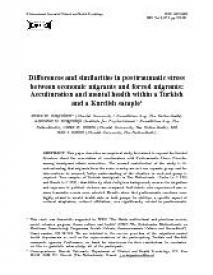Differences and similarities in posttraumatic stress between economic migrants and forced migrants: Acculturation and mental health within a Turkish and a Kurdish sample
This paper describes an empirical study that aimed to expand the limited literature about the association of acculturation with Posttraumatic Stress Disorder among immigrant ethnic minorities. The second contribution of the study is its understanding that migrants from the same country are not one separate group and for interventions to succeed, better understanding of the situation in each sub-group is required. Two samples of Turkish immigrants in The Netherlands - Turks (n = 222) and Kurds (n = 130) - that differ by ethnic/religious background, reasons for migration and exposure to political violence are compared. Individuals who experienced one or more traumatic events were selected. Results show that posttraumatic reactions were highly related to mental health state in both groups. In addition, a specific aspect of cultural adaptation, cultural affiliation, was significantly related to posttraumatic symptoms - however, in opposite direction for both groups: Turkish respondents who held to their traditions were less vulnerable for posttraumatic stress whereas Kurdish participants who lived by their traditions were more vulnerable for posttraumatic problems. The implications of these findings for posttraumatic stress theory and mental health professionals working with traumatized migrant populations are considered.
Geachte bezoeker,
De informatie die u nu opvraagt, kan door psychotraumanet niet aan u worden getoond. Dit kan verschillende redenen hebben,
waarvan (bescherming van het) auteursrecht de meeste voorkomende is. Wanneer het mogelijk is om u door te verwijzen naar de bron
van deze informatie, dan ziet u hier onder een link naar die plek.
Als er geen link staat, kunt u contact opnemen met de bibliotheek,
die u verder op weg kan helpen.
Met vriendelijke groet,
Het psychotraumanet-team.
Reference:
Jeroen W. Knipscheer, Annelieke N. Drogendijk, Cheko H. Gülsen, & Rolf J. Kleber | 2009
In: International Journal of Clinical and Health Psychology, ISSN 2174-0852 | 9 | 3 | 373-391
http://www.aepc.es/ijchp/articulos_pdf/ijchp-328.pdf
In: International Journal of Clinical and Health Psychology, ISSN 2174-0852 | 9 | 3 | 373-391
http://www.aepc.es/ijchp/articulos_pdf/ijchp-328.pdf


